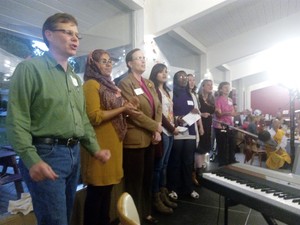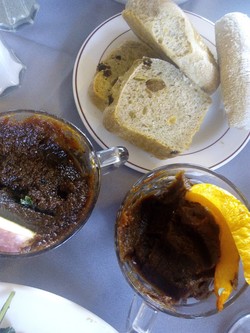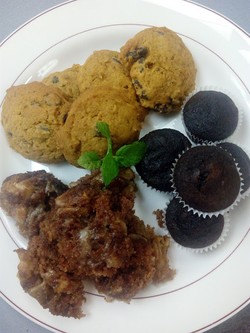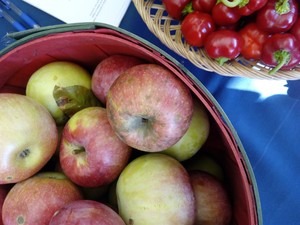As more than 100 guests danced and sang their way into Evergreen Dining Hall to the hymn tune Siyahamba from Stony Point Center’s campus fair—featuring displays on the center’s projects and partners as well as a generous array of appetizers—for the center’s Farm-to-Table Gala, they were greeted by the glorious color palette and abundant foods of the fall harvest.
The reds, greens, purples, and oranges of butternut squash, carrots, tomatoes, beets, potatoes, peppers, arugula, and kale—all grown on Stony Point’s grounds—took center stage at this second annual event, alongside what Paula Sandusky, the center’s senior manager of operations, characterized as a “specific vision of peace, brought to Stony Point by [co-directors] Rick and Kitty Ufford-Chase.”
The Farm-to-Table Gala, held this year on Oct. 11, is a harvest festival and fundraiser designed to support the continued development of Stony Point Center as an incubator for food justice and multifaith community organizing. Stony Point is home to the Community of Living Traditions, a multifaith community dedicated to the practice and study of hospitality, nonviolence and justice, which also hosts a young adult summer institute.
Once the gala’s capacity crowd had been welcomed with music by DeDe Adika, songs by the Stony Point Choral Project led by Warren Cooper of Music Media Ministry, and Sandusky’s greetings, the Rev. Cass L. Shaw, a teaching elder in the Presbyterian Church (U.S.A.), took the platform to offer a word of blessing.
“To ask for God’s blessing seems almost silly,” said Shaw, president and chief executive officer of the Council of Churches of Greater Bridgeport (Ct.), Inc., and chair of Stony Point Center’s Advisory Board, before opening the meal with prayer. “God is blessing us by giving us such an amazing bounty.”

Members of the SPC Choral Project, from left to right: Rick Ufford-Chase, Tasnim Islam, Cass Shaw, Zainab Wassef, Aude Isimbi, Sarah Henkel, Amy Dalton, Kitty Ufford-Chase. —April Leese
The dinner also provided the occasion to present Stony Point’s second annual Living Traditions Award to Jun-san Yasuda, a Buddhist nun in the Japanese Nipponzan Myohoji order, residing at the Grafton Peace Pagoda in Grafton, N.Y. The Living Traditions Award was established in 2014 to honor an individual whose work exemplifies the values of the Community of Living Traditions: justice, peace, nonviolence, earth-consciousness and radical hospitality.
“This event is a chance to make more visible the intentional commitment between what Stony Point is doing physically, spiritually, and with the community,” Shaw said in an interview before the gala. “This is where it all comes together. The local community is beginning to see that we’re not that strange religious community down the road, but we are part of the leaven for the community and for the PC(USA), offering uncomfortable challenges but also offering an anchored, grounded theology of practice.”
Before receiving her award, Yasuda was introduced by Mark Johnson, a member of the Community of Living Traditions and director of the Center for the Bible and Social Justice, located on Stony Point Center’s campus.
Johnson prefaced his remarks by observing that living traditions are evolving.
“They are changing, they are emergent,” said Johnson, echoing Shaw’s earlier reflections on how Stony Point is transforming its cultural, community, and church context. “We are not preserving what has been but we are building something into the future.”

Bread made with locally-sourced flour and eggs from Stony Point’s own free-range hens and SPC-made apple butter. —April Leese
Johnson gave a brief history of Yasuda’s search for meaning as a young person, traveling from her native Japan to India, where she met her teacher. He described the beginnings of her public ministry in 1978, when she accompanied Native American organizers on “The Longest Walk” from San Francisco, Calif., to Washington, D.C. Since then, according to a Sept. 3 news release, “she has crossed the country four more times on foot and logged several thousand additional miles for the cause of peace. She walks beating her drum while chanting the meditative prayer of the Nichiren Buddhist orders: Namu-Myoho-Renge-Kyo.”
After accepting the award, Yasuda said through a translator, “I am not a speaker, but a walker.” She then beat her drum as an expression of thanksgiving, offered a glimpse into her life’s journey, presented gifts to Stony Point’s staff and guests, and invited everyone at the gala to join her in the Maine Walk for Peace, Oct. 9-24, from Ellsworth, Maine, to Portsmouth, N.H., sponsored by Veterans for Peace.
“If people need exercise,” said Yasuda with characteristic humor, “come see me.”
Yasuda’s peace and justice reflection was followed by a “State of the Center” address given by Stony Point’s co-directors, Kitty and Rick Ufford-Chase.
As she began her remarks, Kitty Ufford-Chase gave honor to “those who have gone before us,” saying, “Everything we do has the potential to create the world we want to live in, and the world we want our children to live in.”
By way of illustration, she shared a story about a young Muslim man from Iraq—a previous participant in the center’s multifaith summer institute—who had invited his family to visit the center on the last day of the program, which happened to fall at the end of the Muslim observance of Ramadan.

Butter nut squash cookies, apple cake, and chocolate beet cupcakes. —April Leese
“As members of all three Abrahamic faiths broke bread together around the table, the young man’s father said that it was the most amazing day of his life,” said Kitty Ufford-Chase. “And here we are again at table. It’s hard to put into words, but we can feel it. When you need to feel it again, come back and recharge and connect. We don’t do it by ourselves; we don’t walk alone. We walk together.”
In his remarks, Rick Ufford-Chase, Moderator of the 216th General Assembly (2004) and a ruling elder in the PC(USA), spoke of the complex challenge of running a business while seeking to build a movement around issues of justice, peace, nonviolence, earth-consciousness and radical hospitality.
“There are so many things we have to do, but they can’t be done as an exercise of political will,” Rick Ufford-Chase said. “What I’ve learned is that we have to do it digging deep for our spiritual roots.”
In closing, he said, “We are one community. We’re very different people. We’re everything that you can imagine. We come from all over. We are united in our work of bringing people together. And that unites us to you.”

